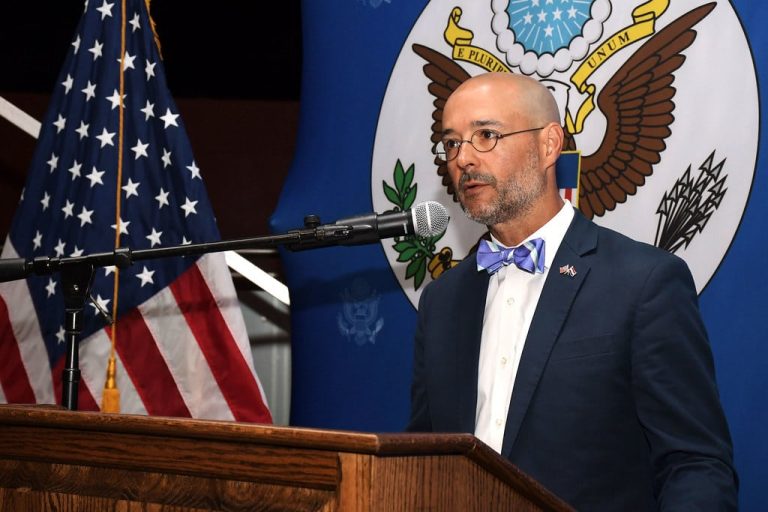30 de julio 2022

Children of Exile: The Births “Sowing Hope” in the Camp of Nicaraguan Farmers

PUBLICIDAD 1M
PUBLICIDAD 4D
PUBLICIDAD 5D
Diplomat Hugo Rodriguez advocated in the US Senate for an end to human right violations and a return to democracy in Nicaragua

Diplomat Hugo F. Rodriguez was proposed as US ambassador to Nicaragua. Photo: Flickr/US Embassy in Paraguay.
Hours after the United States ambassadorial candidate to Nicaragua, Hugo Rodriguez, appeared before the Senate Foreign Relations Committee advocating for the return to democracy and the end of human rights violations in the country, the regime of Daniel Ortega and Rosario Murillo withdrew the approval granted arguing that the diplomat “made meddling and disrespectful statements.”
“The Government of Nicaragua in the use of its rights and in the exercise of its national sovereignty, immediately revokes the approval granted to the postulant Hugo Rodriguez,” said the Nicaraguan Foreign Minister, Denis Moncada, through official media outlets.
Likewise, the foreign minister emphasized that based on diplomacy and in compliance with the postulates of the Vienna Convention, “the ambassador or nominated to ambassador, Hugo Rodriguez, cannot get involved in national issues that are proper of the Nicaraguan people and much less disrespect, offend, humiliate, threaten, be responsible for or be a factor of interference or interventionism in the internal affairs of our country.”
Rodriguez’s statements that bothered the regime were made on Thursday morning before the Senate where he stated that, if ratified as ambassador to Nicaragua, “I pledge to work with Congress, inter-institutional colleagues and international partners to press for the return to democracy, the respect of human rights and the freedom of political prisoners in Nicaragua.”
Similarly, the nominated ambassador emphasized that the US would continue to speak out against the abuses of the Ortega regime, since it is “our commitment” in the framework of the Interamerican Charter of the Organization of American States (OAS). “The Inter-American Charter obliges the hemisphere to defend the democratic rights of the Nicaraguan people,” he stressed.
Rodriguez recalled that with last November’s electoral farce Ortega and Murillo “deprived Nicaraguans” of the opportunity to freely elect their leaders and the hopes for democracy and prosperity of Nicaraguans “vanished.”
Currently, the Nicaraguan regime has more than 180 people imprisoned in inhumane conditions for political reasons, among them seven presidential candidates, human rights defenders, student leaders, journalists and civil society representatives.
The regime also “closed civic space at an alarming rate,” commented the ambassadorial candidate. A total of 1,280 non-profit organizations have been annulled from December 2018 to date. Ninety-four percent of these occurred in the nearly seven months of 2022, when Ortega intensified the dismantling of civil society.
“As a result of the escalating climate of repression, fear and despair, coupled with the failure of the Ortega-Murillo government to address basic needs of the people, hundreds of thousands of Nicaraguans are now refugees, asylum-seekers and migrants throughout the region,” Rodriguez commented.
Finally, the then ambassador candidate expressed that despite not agreeing with the actions of the Ortega-Murillo regime, the relationship between the two countries “is much deeper than political leadership,” since “more than 400,000 people of Nicaraguan descent live in the US, about 6,000 US citizens visit Nicaragua each year and another 20,000 reside there.”
In the same vein, Rodriguez commented that the United States has long supported economic development in all Central America, with the purpose of helping it consolidate into a prosperous, stable and democratic center.
That’s why, if confirmed as ambassador, I will engage with voices throughout Nicaraguan society to share our vision of inclusive economic growth, as stated by President (Joe Biden) at the recent Summit of the Americas in Los Angeles. “We will seek to support civil society groups that provide essential services in the areas of health, education and poverty reduction, including organizations that have been targeted by the Government of Nicaragua,” Rodriguez said.
“We will do what we can to offer the Nicaraguan people a better future in their own country. We know that addressing the root causes of irregular migration and forced displacement, throughout Central America and including Nicaragua, means ensuring respect for human rights, generating economic opportunities, and improving citizens security,” he concluded.
This article was originally published in Spanish in Confidencial and translated by Havana Times
Archivado como:
PUBLICIDAD 3M
Confidencial es un diario digital nicaragüense, de formato multimedia, fundado por Carlos F. Chamorro en junio de 1996. Inició como un semanario impreso y hoy es un medio de referencia regional con información, análisis, entrevistas, perfiles, reportajes e investigaciones sobre Nicaragua, informando desde el exilio por la persecución política de la dictadura de Daniel Ortega y Rosario Murillo.
PUBLICIDAD 3D